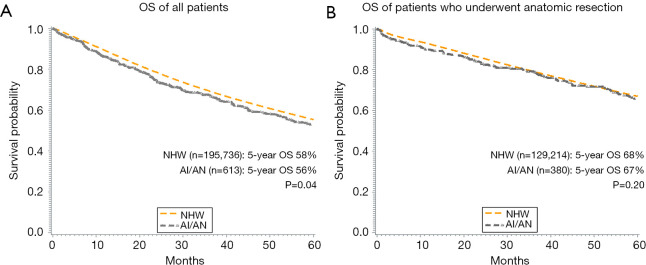
Click to Enlarge: OS of patients with stage I NSCLC by race who underwent any treatment (A) and who underwent only lobectomy or more extensive anatomic resection (excluding segmentectomy) (B), from the NCDB, 2004–2017. OS, overall survival; NHW, non-Hispanic White; AI/AN, American Indian/Alaska Native; NSCLC, non-small cell lung cancer; NCDB, National Cancer Database. Source: Journal Of Thoracic Disease
MINNEAPOLIS — American Indian/Alaska Native (AI/AN) patients have lower overall survival rates from non-small cell lung cancer (NSCLC), and at least part of the reason is that they are less likely to receive guideline-concordant care, according to a new study.
“Several studies have shown racial disparities in lung cancer care in the United States in the Black and Hispanic populations, but not many have included American Indian/Alaska Native (AI/AN) patients,” according to University of Minnesota Medical School researchers.
In response, they retrospectively evaluated the factors associated with receipt of guideline-concordant care in AI/AN and non-Hispanic white (NHW) patients with stage I non-small cell lung cancer (NSCLC) and describe the relationship between guideline-concordant care and survival outcomes in these populations. Results were published in the Journal of Thoracic Disease.1
The researchers used the National Cancer Database to identify NHW and AI/AN patients diagnosed with stage I NSCLC between 2004 and 2017. They evaluated the utilization of anatomic resection among both NHW and AI/AN and described the variables associated with anatomic resection. At the same time, the study calculated 5-year overall survival (OS) by treatment and race in the 196,349 patients—195,736 (99.69%) NHW and 613 (0.31%) AI/AN.
“Relative to NHW, AI/AN were more frequently diagnosed at a younger age (40% vs. 28% diagnosed at 18–64 years of age; P<0.001) and more commonly resided in rural areas (14% vs. 5%; P<0.001),” the authors reported. “In our multivariable analysis adjusting for all patient factors [age at diagnosis, sex, race, residence location, Charlson Comorbidity Index (CCI), tumor stage, lymph node status and treatment facility], AI/AN patients were less likely to undergo anatomic resection than NHW patients [odds ratio (OR), 0.74; 95% confidence interval (CI): 0.62-0.89]. In our unadjusted survival analysis, AI/AN patients had lower 5-year OS than NHW (58% vs. 56%; P=0.04). When adjusted for surgery, this difference was no longer significant.”
The study found that AI/AN patients with stage I NSCLC undergo anatomic resection less frequently than do NHW and have lower 5-year OS than NHW. But the survival difference is mitigated when AI/AN undergo anatomic resection, they added.
“Racial disparities in the management of early-stage lung cancer are well described,” the researchers wrote. “It has been shown that Black and Hispanic populations receive lower rates of guideline-concordant care for early-stage cancer than do non-Hispanic white (NHW) patients, however there is limited information on American Indian/Alaskan Native (AI/AN) patients.”
AI/AN are a growing population, according to the report, experiencing an 86.5% increase from 5.2 million [2010] to 9.7 million [2020], and represents 2.9% of the United States population, the incidence of lung cancer is higher than in the NHW population.
The study pointed out that, according to the National Comprehensive Cancer Network (NCCN), the majority of patients with operable stage I NSCLC should undergo anatomic lung resection.
Study results suggest “that delivery of adequate care to this population could help reduce survival disparities, even if they are minor,” the researchers advised. “Minimizing disparities in survival requires that AI/AN patients receive high-quality care. This largely depends on mitigation of disparities throughout the healthcare system.”
They said that potential areas of future research include analyzing the availability and utilization of lung cancer screening in AI/AN, as well as evaluation of rural and urban AI/AN access to thoracic surgeons.
- Schoephoerster J, Praska C, White M, Salami A, et. Al. A nationwide analysis of disparities in guideline-concordant care in American Indians and Alaska Natives with stage I non-small cell lung cancer. J Thorac Dis. 2023 Nov 30;15(11):5891-5900. doi: 10.21037/jtd-23-801. Epub 2023 Oct 27. PMID: 38090326; PMCID: PMC10713313.

